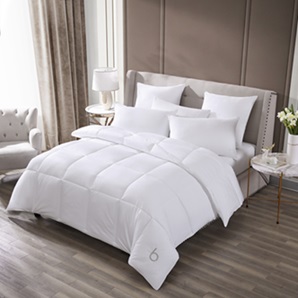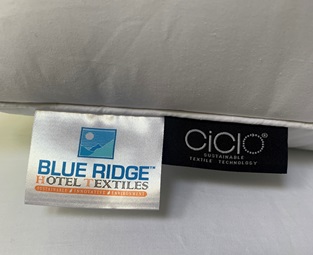 NATIONAL REPORT—Earlier this year, Blue Ridge Hotel Textiles announced CiCLO® biodegradable polyester as its core down alternative fiber. Blue Ridge Hotel Textiles joins companies such as McDonald’s and Hanesbrands in utilizing the patented CiCLO® technology, which is owned, manufactured and distributed by Intrinsic Advanced Materials. Target is also selling numerous items—bathmats and sheet sets for example—that utilize fibers treated with CiCLO®.
NATIONAL REPORT—Earlier this year, Blue Ridge Hotel Textiles announced CiCLO® biodegradable polyester as its core down alternative fiber. Blue Ridge Hotel Textiles joins companies such as McDonald’s and Hanesbrands in utilizing the patented CiCLO® technology, which is owned, manufactured and distributed by Intrinsic Advanced Materials. Target is also selling numerous items—bathmats and sheet sets for example—that utilize fibers treated with CiCLO®.
According to Andrea Ferris, CEO of Intrinsic Advanced Materials, hospitality will quickly follow retail in the adoption of CiCLO®.
When added to synthetic fibers including polyester and nylon, CiCLO® technology allows microbes to treat synthetic fibers like natural fibers. When CiCLO®-treated synthetic textiles unavoidably shed microfibers and the fibers ultimately end up in landfills, soil, sea water, and/or wastewater treatment plant sludge, microbes can break down and digest the molecules similarly to how they do with naturally biodegradable materials.
While the rate of biodegradation of any material that is inherently biodegradable is highly dependent on actual environmental conditions, long term studies have proven that CiCLO® polyester and nylons fully biodegrade in roughly 2.5 to four years in third party lab studies using ASTM and ISO Test Methods—comparable to the biodegradation rate of wool.
“We perfected biodegradable plastics for textiles applications to help solve the massive problem of unavoidable microplastic pollution caused by synthetic textiles,” Ferris says.
‘A Groundbreaking Advancement’
In its announcement, Blue Ridge Hotel Textiles said CiCLO® represents a groundbreaking advancement in sustainable materials, serving as the inaugural and exclusive substance capable of significantly enhancing the biodegradability of polyester and nylon—the foundational elements of hospitality essentials such as blankets, pillows, sheets, carpet and shower curtains.
Tim Keegan, Senior Vice President at Blue Ridge Hotel Textiles, said, “CiCLO® is designed to effectively break down in various environmental conditions, offering a versatile solution for a wide range of disposal environments. In essence, CiCLO® not only maintains the longevity of synthetic materials but also contributes significantly to the overall sustainability of the textile industry.”
“Blue Ridge Hotel Textiles has been using CiCLO in our product development pipeline for well over two years, creating new fiber formulations that not only deliver on the promise of a biodegradable polyester fill material, but as important delivers on our promise to supply more bedding comfort through product design to hotel guests,” Keegan adds. “At Blue Ridge Hotel we are fully committed to shipping 100 percent of our hotelier down alternatives in CiCLO biodegradable polyester fibers. Our internal development of proprietary CiCLO fibers that are processed using Blue Ridge-owned equipment is resulting in exceptional material at an improved cost/benefit value to hotels.”
“We are using CiCLO in all filled products for hotels,” Keegan says. We are using CiCLO in pillows, blankets, comforters, toppers, and mattress pads right now. We are replacing petroleum based polyester fibers that do not biodegrade at the rate of CiCLO.”
Polypropylene Solution Coming
With the CiCLO® solution for polyester and nylon available, Ferris says her company is soon to offer a solution for polypropylene as well. Some of the products that use polypropylene include carpeting, rugs, and mats.
Enhancing the biodegradation of synthetic fibers is critical in a global environment so immersed in microplastics in materials, the air, and water.
University of New Mexico Study
Earlier this month, the University of New Mexico announced that researchers there have detected significant concentrations of microplastics in the testicular tissue of both humans and dogs, adding to growing concern about their possible effect on human reproductive health. The study is one in a long series of studies demonstrating the degree to which microplastics penetrate human tissue.
Legislators are also concerned about microplastic pollution caused by textiles. Around this time last year, in a letter to the U.S. Environmental Protection Agency and the National Oceanic and Atmospheric Administration, Connecticut Attorney General William Tong led 16 states in sounding the alarm over pervasive plastic microfiber pollution, urging EPA and NOAA to use the full extent of their authority to protect public health and the safety of our oceans.
“The annual global use of polyester alone is 63 million metric tons,” Ferris says. “It is used in so many things because it is durable, high performance, affordable and globally available.”
 Ferris says there are not many solutions to microfiber pollution. Capturing fibers through filtration at commercial scale and home scale is ideal but costly and will be slow to implement. “In California, a bill was put forward requiring filtration on home washing machines,” she says. “It was vetoed because there would be an increased cost to consumers.” Source reduction, product redesign and the use of an additive such as CiCLO® are more practical solutions.
Ferris says there are not many solutions to microfiber pollution. Capturing fibers through filtration at commercial scale and home scale is ideal but costly and will be slow to implement. “In California, a bill was put forward requiring filtration on home washing machines,” she says. “It was vetoed because there would be an increased cost to consumers.” Source reduction, product redesign and the use of an additive such as CiCLO® are more practical solutions.
“Brands are looking at: How do we quantify the problem?” Ferris says. “NGOs are very concerned as well. The NGO 5 Gyres is focusing on microfibers. CiCLO® is participating in the upcoming Textile Symposium, WOVEN, which aims to bring together leading textile brands, with several key scientists and stakeholders working to solve this problem of microplastic pollution caused by textiles. It is being worked on at every level.”
CiCLO® Fibers Globally Available
For quality assurance and traceability, Intrinsic Advanced Materials only sells CiCLO® technology to its worldwide network of certified fiber and yarn manufacturers. “We have about 50 or so around the globe,” Ferris says. “Our fibers are available worldwide so that brands and retailer can adopt CiCLO® as a platform solution, not just for limited capsule collections.” Brands and retailers may purchase CiCLO® fiber and yarn directly from the network of CiCLO® Certified Manufacturers.
Ferris says CiCLO® is generally affordable in the market and Intrinsic Advanced Materials supports suppliers with guidelines on how to responsibly market the benefits of CiCLO® to consumers. “We really have a robust cobranding program,” she says.
When asked where else in the hospitality industry CiCLO should be used, Keegan said: “CiCLO can and should be used in all hotel environment materials where polyesters and other non-biodegradable plastics are used. Hotels use non-biodegradable polyesters in many applications—our vision is in complete concert with those of Intrinsic Advanced Materials and founder Andrea Ferris. Stop dangerous microplastic pollution. CiCLO has applications in carpeting, window coverings, bath products, and many more. For us, we have bedding materials that have been sleep-trial and laboratory tested that hold up to the rigors of hotel use, while holding it cost neutral.”
In what product areas does CiCLO have the greatest potential to accelerate biodegration? “Frequently used and laundered bedding products and accessories, because these are the biggest generator of microplastic pollution in our product categories,” Keegan says. “Outside of home textiles there are enormous opportunities in apparel, footwear, and other major product classifications.”
What hotel brands are most embracing/interested in this technology? “Every hotel we have engaged has been receptive to CiCLO as part of their wider-ranging sustainability programs. It will take time but the encouraging part to us is CiCLO offers a real solution to a multiple-decades old pollution-generating problem and will have a positive effect globally cleaning up the harmful polyester that has entered our living environment and food supplies. With our private ownership, global supply chain reach and vertically owned manufacturing factories, Blue Ridge Hotel will continue to invest in and develop new CiCLO based bedding products for hotels.”
Glenn Hasek can be reached at greenlodgingnews@gmail.com.






